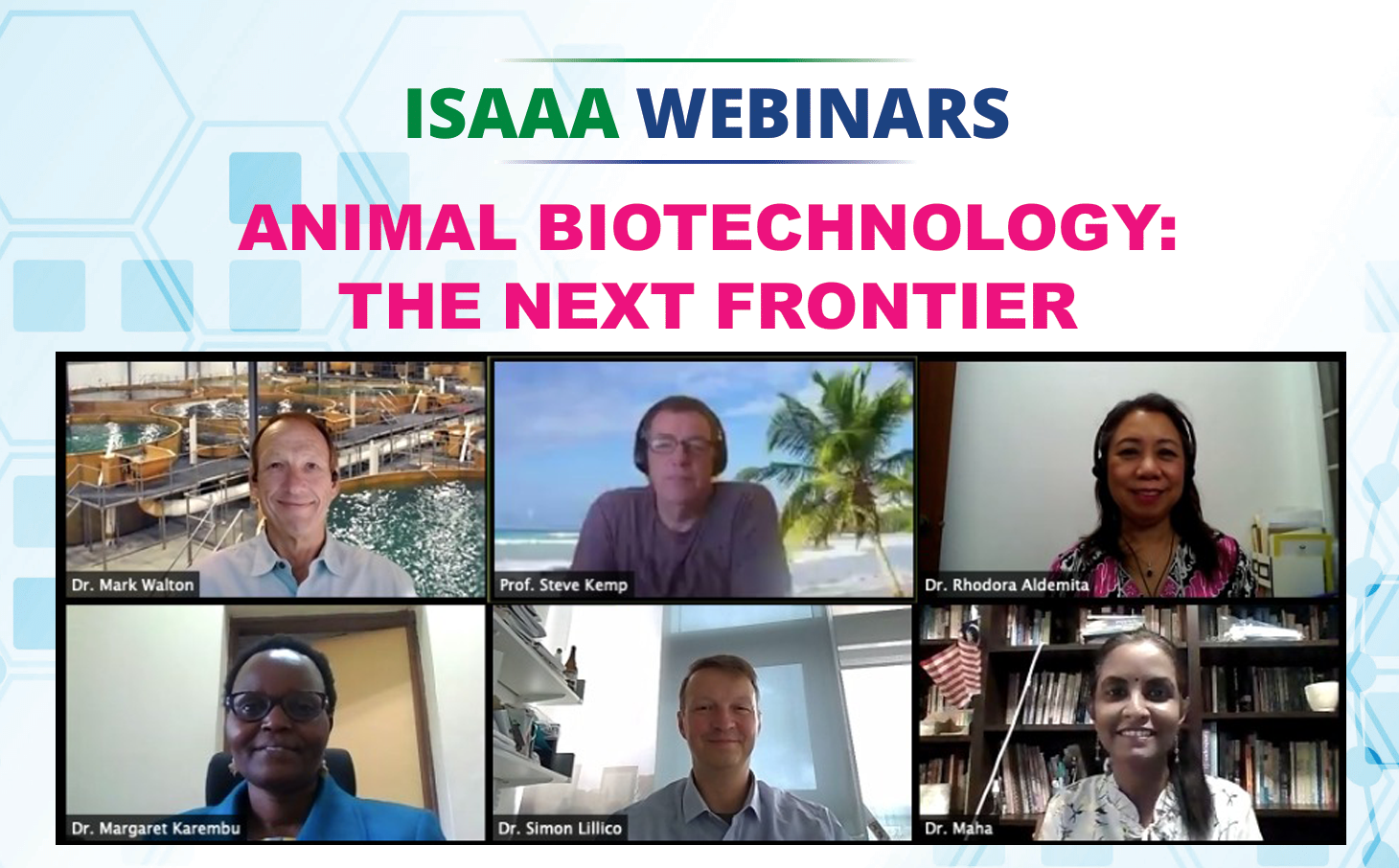
Animal Biotech Offers Potential in Addressing Food Insecurity
September 2, 2020| |
Animal biotechnology has been primed to contribute significantly towards addressing the challenge of food security, especially in the developing world. During a webinar organized by ISAAA AfriCenter, experts agreed that animal biotechnology is an inevitable part of the toolkit to address climate-related challenges.
Prof. Steve Kemp, an animal geneticist at the International Livestock Research Institute (ILRI), underscored the importance of genetic selection in driving improvements in productivity. Prof. Kemp revealed how an ILRI project to develop trypanosomiasis-resistant cattle using biotechnology could transform the lives of smallholder farmers who depend on livestock. "African trypanosomiasis is an extremely important pathogen, and is estimated to cost about $1 billion annually across Africa," he said. It also emerged that marine-based proteins are gaining a growing market share and putting massive pressure on wild fisheries. According to the Food and Agriculture Organization of the United Nations, more than 90% of the world's fisheries are fully fished or overfished. Experts rooted in more innovative ways to address this challenge, one of which is through genetic engineering.
Dr. Mark Walton, the Chief Technology Officer at AquaBounty Technologies, explained that AquAdvantage Salmon (AAS) offers many prospects in addressing the imminent seafood gap and building an array of nutritious food. "AAS has faster growth and greater feed efficiency thus takes less time in water and less feed to get a kilo of proteins," said Dr. Walton. He added that investment in the AquAdvantage system is growing quite significantly and AAS genetics is key to making this system profitable. He said AquAdvantage will be an important factor in the continued growth of salmon farming in land-based Recirculating Aquaculture Systems in the US and beyond.
Speaking on the importance of editing livestock genome, Dr. Simon Lillico of the University of Edinburgh hailed the effectiveness of genome editing in developing pigs resistant to porcine reproductive and respiratory syndrome (PRRS). PRRS is a viral disease that has had a major impact on pig production in the European Union. Dr. Lillico revealed the disease is estimated to cost about $2 billion in production costs annually.
ISAAA Global Coordinator, Dr. Mahaletchumy Arujanan, highlighted the need to carry out public engagements in the area of animal biotechnology. Dr. Arujanan called on scientists to speak up and play a role in influencing public opinion. She said ISAAA is committed to working with stakeholders to promote decision-making processes.
For more information on ISAAA's Genome Editing webinars, contact Dr. Margaret Karembu at mkarembu@isaaa.org.
| |
You might also like:
- Biotechnology for the Livestock Industry
- Biotech-improved Animals
- Filipino Regulators Learn from International Experts in Regulating Animal Biotech Products
Biotech Updates is a weekly newsletter of ISAAA, a not-for-profit organization. It is distributed for free to over 22,000 subscribers worldwide to inform them about the key developments in biosciences, especially in biotechnology. Your support will help us in our mission to feed the world with knowledge. You can help by donating as little as $10.
-
See more articles:
-
News from Around the World
- Genomes of Three Most Troublesome Agricultural Weeds Published
- Scientists Discover First Known Gene to Impart Resistance to Speck Disease of Tomatoes
- UC Davis-Led Study Finds Missing Link in Evolutionary History of Rubisco
- Asia-Pacific Sets Responses and Recovery Plans on COVID-19 and Hunger
-
Research Highlights
- Plant Enzymes Found to Have a Vital Role in Flood-Resistance Adaptability
- Experts Review Potential of Plant-Based Edible Vaccines
-
Plant
- South Korea Promotes the First Genome-edited Food Crop
- South Korea's First Genome Edited Petunia Approved in the U.S.
- Animal Biotech Offers Potential in Addressing Food Insecurity
-
Health
- Map Catalogs Effects of Coronavirus Mutations
- Pregnant Women Face More Risks from COVID-19
- Washington University Saliva Test for COVID-19 Faster and Easier
-
Read the latest: - Biotech Updates (December 17, 2025)
- Gene Editing Supplement (December 17, 2025)
- Gene Drive Supplement (February 22, 2023)
-
Subscribe to BU: - Share
- Tweet

